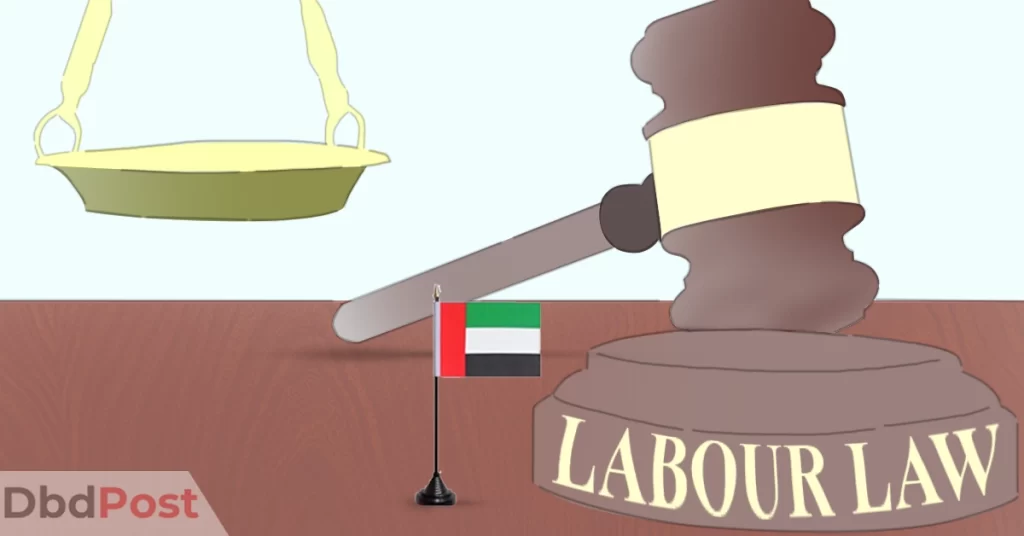The UAE Labour Law is a complicated law that covers a lot of different things. You need expert legal advice if you want to understand and follow it. The UAE has recently implemented a new labor law, but do you know what it includes?
The new labour law in UAE became effective on February 2, 2022. If you are an employer or employee in the private sector, it is important to understand how the law affects you. The new law replaces Federal Law No. 8 of 1980 and governs the private sector’s employment relations.
The UAE labour law focuses on employee rights in UAE. Also, it covers work permit conditions, wages, leaves, and employee benefits. Also, the laws discuss workers’ safety, protection, and health care.
Our Dbd team has put together a guide to the new labour law in UAE.
So, without any delays, let’s get started.
What are the available work permits under UAE labour law?
Work permits in UAE allow employers to recruit foreign employees. There are different types of work permits that the Ministry of Human Resources & Emiratisation(MoHRE) issues. Below are some of the most issues with work permits in the UAE. [1] MoHRE, “MoHRE Home, https://www.mohre.gov.ae/en/home.aspx”
- One-mission permit: A MoHRE-registered company can hire a worker from abroad to help with a specific project. This is a good option for businesses needing help with a project but needing more resources to staff the position locally.
- Part-time work permit: This permit allows employers to hire workers under part-time contracts. Workers can work for more than one employer but must have permission from the Ministry to do so.
- Freelance permit: This permit allows individuals to work for themselves without being sponsored by a specific organization or employer. You don’t need a valid employment contract for this work permit.
- Transfer work permit: This type of permit allows a worker not from UAE to transfer between two workplaces registered with the MoHRE.
- Juvenile permit: This permit allows to employ of individuals between the ages of 16-18 years.
What are the working hours under the new UAE labour law 2022?
Article 15 of the UAE labour law states that employees can only work 48 hours weekly. During Ramadan, working hours should be reduced by 2 hours a day. In special circumstances where overtime is necessary, employers can ask employees to work an extra 2 hours per day. [2]UAE Labour Law, “Article(15), https://www.mohre.gov.ae/handlers/download.ashx?YXNzZXQ9NjU5MA%3d%3d “
In addition, the working hours shall be counted in case of delays due to bad weather or malfunction of the employer-provided transportation.
What are the UAE labour laws regarding wages?
According to the MoHRE, employers must have the right to pay employees’ wages on the agreed-upon due date. Employers must pay employees through the Wages Protection Scheme or another ministry-approved system.
Also, the employers must submit all the necessary paperwork to the authority to prove the requested payments. In case of failure, the ministry can take legal against the establishment as mentioned in article 16 of the labour law. [3]Offical site of MoHRE, “Regulation of Labour Relations, … Continue reading
Although there is no set minimum wage by the MoHRE, the labor law states that wages must be enough to cover employees’ basic needs. Also, employers must pay the salary on time.
When can employees take leave?

Employees who have completed six months of continuous service with their employer are entitled to annual leave. Employees who have worked for the company for one year are allowed 30 days of paid leaves. On the other hand, an employee who has worked for six months but not one year is allowed two days of paid leave per month.[4]Offical portal of the UAE, ” Annual leave, … Continue reading
However, part-time employees are entitled to annual leaves based on working hours, as mentioned in article 18. The leaves are calculated by dividing the total number of hours worked by the number of days in the year, then multiplying that by the number of days legally allowed to take off.
What are the other various leaves a worker gets?
As mentioned in article 21 of the UAE labour law, workers can get leaves in the following scenarios:
- If a worker needs to take a study break or go to a test.
- Every person in the country is entitled to a break from work to do national or reserve service by the laws and regulations.
- If a worker experiences the death of a family member, they are entitled to leave. However, the worker must provide proof of the death after returning to work.
- The worker is entitled to parental leave if they provide proof of birth.
When is a worker allowed to leave without warning?
The worker is allowed to leave the workplace without any warning under the following circumstances as stated in article 26:
- Under the presence of a probable source of ignition.
- Under the presence of exposed electrical wires.
- If they come into contact with dangerous biological and chemical substances.
- If there are unusual temperatures that cause burns.
- Under loud noises that might cause permanent hearing damage.
- Under radiation.
Penalty for leaving without notice
If an employee leaves their job before the end of their contract without notice. They will be banned from working in the UAE for one year.
If an employee is absent for seven consecutive days without a lawful reason, their employer can report this to the MoHRE. To put this policy in action, the employer must have no knowledge of the employee’s location and no contact information.
What does the UAE labour law say about underage employment?

For underage or juvenile employment, there are different rules which are regulated under article 4 of the new labour law in UAE. First, the employer must have a juvenile permit from the MoHRE to employ an individual who is older than 15 but younger than 18 years. Secondly, they cannot work in hazardous or harmful industries. [5]Offical site of MoHRE, “Regulation of Labour Relations, … Continue reading
Also, the employer must have particular records of juvenile workers with information like guardian contact, residence, date of employment, and more. Furthermore, any training given must follow safety and health standards.
In the case of organizations providing professional training, the intuition must be registered with government authorities.
UAE labour laws for workers’ safety and healthcare
As article 22 of the UAE employment law mentions, employers must provide a safe and healthy work environment for their employees. The organization must also follow the health and safety rules set by the ministry. In addition, the employer must take all practical measures to prevent, reduce and eliminate health hazards in the workplace.
The employer must inform all the probable risks in the workplace to the employees along with safety measures before employment. Also, the employer must provide a supervised first aid kit with all the necessary supplies.
As an employee, you must follow the following set of rules:
- Use all the protective clothing provided by the employer during working hours.
- Follow the instructions and safety drills to ensure your safety in the workplace.
- The employer is entitled to take disciplinary action against the employee for violating the safety policies.
The Ministry shall coordinate with the authorities regarding health and worker safety on the following: [6]Offical site of MoHRE, “Regulation of Labour Relations, … Continue reading
- Employer compliance with health insurance.
- Coordinate with local and federal authorities for worker safety.
- Verifying and standardizing the standards for the health and safety of workers.
- Penalize the companies in the case of failure or violation of the health and safety of the workers.
Work injuries

In the case of any workplace injuries or diseases suffered on the work premises. The employer is liable to pay for all the medical expenses according to article 23 of the UAE labour law. The employer must follow a set of rules: [7]Offical site of MoHRE, “Regulation of Labour Relations, … Continue reading
- The worker must be treated in private or government healthcare facilities.
- The employer must compensate all the healthcare costs till the worker is fully recovered.
- In case of any disabilities, the treatment shall be continued to be paid until established.
- The employer must cover the cost of artificial and prosthetic limbs for established disabilities.
- The treatment costs include all the surgical procedures, X-rays, and purchase of medication or rehabilitation equipment.
- Employers must reimburse all the transportation costs during the treatment.
However, the worker may not be eligible for medical compensation for injuries caused due to the direct violation of safety instructions. The employer shall prove the violation of the rules.
In case of the death of a worker due to a workplace accident or disease, the employer must pay all the funeral expenses. Also, the beneficiary of the deceased is entitled to compensation.
How can employers impose discipline on workers?
In this part, we’ll look at what it takes for employers to discipline their staff based on article 24 of the labour law. The following criteria shall be used to determine the appropriate disciplinary sanctions for workers based on the severity of the committed violation. [8]UAE Labour Law, “Article(24), https://www.mohre.gov.ae/handlers/download.ashx?YXNzZXQ9NjU5MA%3d%3d “
- In the event, a worker releases sensitive work-related data and information.
- If the action of the employee risks the safety of the workplace.
- The financial damage due to the action of the employee.
- The impact of damage on the company’s reputation due to the employee’s action.
- Violation of power given to the worker by the company.
- The rate of occurrence of rules violation.
What happens when violations are found during work inspections?
Labour inspections will be carried out by inspectors who are competent and authorized by the Ministry. These inspectors will be mentioned in article 33 of the UAE labour law. [9]UAE Labour Law, “Article(33), https://www.mohre.gov.ae/handlers/download.ashx?YXNzZXQ9NjU5MA%3d%3d “
If a labour inspector finds a violation of any regulations during an inspection, they will document the violation in a report. They will then submit this report to the authority, who will take appropriate action against the violator.
If needed, the labour inspector can ask for help from other authorities. Employers and their representatives are responsible for helping the labour inspector do their job. They must also respond to summonses or send a representative if requested.
Employment termination in the case of bankruptcy
There are several reasons why an employment contract might be terminated. If an employer goes bankrupt or a court rules them insolvent, the Ministry automatically cancels the worker’s permit. [10]UAE Labour Law, “Article(25), https://www.mohre.gov.ae/handlers/download.ashx?YXNzZXQ9NjU5MA%3d%3d “
Another reason for contract termination is if the employer cannot continue his business due to exceptional economic circumstances. In both cases, the worker will get a new work permit, as mentioned in article 25. [11]UAE Labour Law, “Article(25), https://www.mohre.gov.ae/handlers/download.ashx?YXNzZXQ9NjU5MA%3d%3d “
When can employment benefits be reduced?
The employer is eligible to deduct from the workers’ end-of-service benefits for full-time employment in the following cases: [12]UAE Labour Law, “Article(29), https://www.mohre.gov.ae/handlers/download.ashx?YXNzZXQ9NjU5MA%3d%3d “
- Amounts owed by the worker to recover loans or overpayment.
- To get the money that was supposed to be paid by the workers as a contribution to their retirement or insurance.
- Pending dues and fines for violations of company regulations applicable at the establishment and approved by Ministry.
- A worker was ordered by a court to pay money that they owe to the employer.
- Amount of money spent by the employer for repairing damage caused by the worker.
However, the deductions must be calculated for work permits other than full-time contracts, as mentioned in article 30. [13]UAE Labour Law, “Article(30), https://www.mohre.gov.ae/handlers/download.ashx?YXNzZXQ9NjU5MA%3d%3d “ You can calculate the percentage of your end-of-service benefits. Divide the number of hours specified in your employment contract by the total number of working hours in a full-time contract.
This percentage should then be multiplied by the value of the end-of-service benefit due for full-time employment contracts. In addition, the benefits do not imply employment if its duration is less than a year.
Transfer of workers according to UAE labour law
In the UAE, there are specific rules that govern the transfer of workers between employers according to article 27 of the labour law. [14]UAE Labour Law, “Article(27), https://www.mohre.gov.ae/handlers/download.ashx?YXNzZXQ9NjU5MA%3d%3d “The Minister may issue a resolution specifying the mechanisms for the transfer of workers governed by the specific circumstances.
In most cases, a worker can only be transferred to another employer if their original contract term has ended and it is not renewed. Another case is if the employer terminates the contract without any reason attributed to the worker.
How are labour disputes addressed in the UAE labour law?

The labour law in the UAE is designed to protect workers’ rights and ensure that they are treated fairly. However, there are times when labour disputes arise between employers and employees. If this happens, the labour law provides a process for resolving the dispute.
The labour law divides disputes into individual (article 31) and collective (article 32) disputes.
Individual dispute
An individual dispute arises between an employer and a single employee. This type of dispute is addressed in the labour laws as: [15]UAE Labour Law, “Article(31), https://www.mohre.gov.ae/handlers/download.ashx?YXNzZXQ9NjU5MA%3d%3d “
- If an individual can file a complaint against the employee in dispute with an eligible beneficiary for investigation.
- If the dispute can be eligible to go to court within 14 days from the date of filing the complaint.
- The worker is entitled to 2 months’ worth of salary if the worker continues to work for the employer while the dispute is in court.
Collective dispute
A collective dispute arises between an employer and a group of employees. The labor law addresses these types of disputes as: [16]UAE Labour Law, “Article(32), https://www.mohre.gov.ae/handlers/download.ashx?YXNzZXQ9NjU5MA%3d%3d “
- If the complaint is filed via specified channels by the ministry. Also, the complaint must be filed within two weeks of the dispute.
- The Ministry of Labour may protect workers’ rights by imposing a provisional seizure on an establishment.
- If the ministry finds that the workers were not paid what they were owed. The workers are entitled to money from the bank guarantee or insurance that was set up to protect them.
- If the parties cannot agree on a settlement or if either party does not comply with the settlement terms. The dispute will be referred to the Collective Labour Disputes Committee.
- The committee’s decision is set as final and cannot be appealed.
Related Stories
- If you need to check a labour contract online and don’t know where to start, check this guide – how to check labour contract online in UAE.
- Similarly, check this guide on how to get a labour card copy online in UAE, to get your labour card online.
FAQs on UAE labour law
What are the labour laws in UAE?
The UAE employment law is intended to safeguard workers’ rights and ensure they are treated fairly. The labour code covers many issues, including working hours, leave, termination, etc.
What is the basic salary as per UAE labour law?
The labor law doesn’t have a set amount for the basic salary. But the law says that an employee’s salary should be enough to cover their basic needs. The salary should also be paid on time and in full.[17]UAE Offical Site, “Minumim Wages, https://u.ae/en/information-and-services/jobs/payment-of-wages#:~:text=the%20employment%20contract.-,Minimum%20wages,-There%20is%20no”
What are the working hours as per UAE labour law?
In the UAE, the standard working week is 48 hours. This is 8 hours per day for six days. However, there are some jobs where workers are allowed to work more than 48 hours with 2 hours of overtime per day.[18]UAE Labour Law, “Article(15), https://www.mohre.gov.ae/handlers/download.ashx?YXNzZXQ9NjU5MA%3d%3d “
Can an employer terminate an employee without notice?
No, an employer cannot terminate an employee without any notice. However, the employer can transfer the employee to another employer.
Can I resign after six months in UAE?
Yes, you can resign after six months in the United Arab Emirates. You and your employer can agree to end your job. If you do this, you must ensure all legal requirements are met.[19]Connectlegal, ” Can I resign contract, … Continue reading
Final thoughts
The UAE Labour Law protects the rights of employees and employers in the UAE. This law sets out the minimum number of hours employees can work, their wages, leaves, and safety and healthcare standards. The law also states the disciplinary procedures that must be followed if an employee or employer breaks a contract or commits other types of misconduct.
We hope this Dbd guide has helped you to know everything about the new labour law in UAE 2025.
- 108shares
- Facebook Messenger
About the author
DbdPost Staff is a team of writers and editors working hard to ensure that all information on our site is as accurate, comprehensive, and trustworthy as possible.
Our goal is always to create the most comprehensive resource directly from experts for our readers on any topic.




